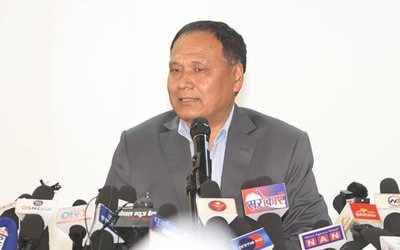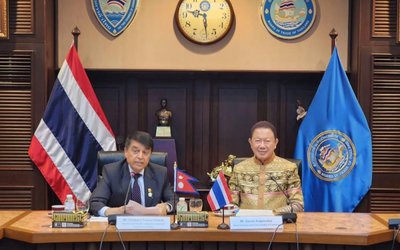Following the eleventh hour political deal, the government will present the budget for fiscal year 2010/11 at the parliament on November 19.
That will be good four months later than the start of the fiscal year.
The delay caused by political wrangling is feared to cast a long-term shadow on the country’s efforts to develop and alleviate poverty.
Worse, the political deal – read from the opposition Maoist angle – could just allow the passage of bland budget without any new programs or plans.
A few weeks ago, Finance Minister Surendra Pandey had rued that of the Rs 125 billion he planned to spend on development this year, less than one percent could actually be spent for the first few months due to the delay in budget.
That is what has become the most worrying aspect of the delay.
Since the late-1990s, the economic growth rate of Nepal has not been able to pick up the pace.
Despite the cessation of conflict, there has been no peace-dividend.
Rather, in the last three years, the country could not even get a budget on decent time. First there was delay because of the time taken for the Maoists to form the government after the Constituent Assembly (CA) election. On second year, disruption by then opposition Maoists upset the budget timetable. And on the third year, this time, the government is unable to present budget even after four months passed since the start of the new fiscal.
As is apparent by the remarks of Finance Minister Surendra Pandey, this year’s delay is sure to cause incalculable loss on development.
That, in turn, will hold back the economic growth.
“This will impact the efforts to alleviate poverty. In fact, there is a danger that the achievements we made in certain Millennium Development Goals (MDGs) could slide back,” said Dr. Jagadish Chandra Pokharel, vice chairperson at the National Planning Commission (NPC). (See box)
He also regretted that due to lack of timely budget, donors like Asian Development Bank (ADB) and World Bank (WB) have hinted they could withhold their assistance.
What is in store?
If the budget was not delayed, this year the government was mulling to present the budget totaling around Rs 347 billion.
Due to the delay, the total outlay is expected to be brought down a little.
The government had also planned to review the custom rates, particularly of luxury items like expensive vehicles and jewelry. Alarmed by the huge import growth, the government was also considering to put a cap on such imports.
But recent reports suggesting a dip in import could hold back the government’s hand a little. In the past three months, the government’s revenue collection growth is only 11 percent compared to around 50 percent last year.
Return of BoP Ghost
Amid the delay in the presentation of budget and the apparent neglect on the economy, the ghost of Balance of Payment (BoP) deficit has returned after a brief respite.
The whole of last year, the economy suffered from the spiraling BoP deficit.
At its height, the loss soared to over Rs 20 billion before it finally cooled and was brought to near zero around June.
But the recent report by the central bank based on the economic performance of the first two months of the current fiscal showed that the BoP crisis has returned.
The overall BOP recorded a deficit of Rs. 4.36 billion in the two months of 2010/11, according to the report. The current account also registered a deficit of Rs. 3.26 billion.
Experts have said that the BoP crisis cannot be sustainably addressed till the issue of huge trade deficit is not resolved.
The NRB report showed that during this period, Nepal's merchandise exports declined by 3.8 percent to Rs. 10.68 billion.
On the other hand, the merchandise imports during the same period grew by 5.2 percent to Rs. 61.07 billion. The trade gap in this period was over Rs 50 billion.
Trade deficit had risen by 34.5 percent to Rs. 46.9 billion in the same period last year.
“As a result of the slowdown in exports and accelerated import growth, the ratio of export to import dropped to 17.5 percent in the two months of 2010/11 from 19.1 percent a year ago,” the report states.
Another serious indicator has been the poor revenue mobilization.
The report stated that the revenue mobilization, in this period, grew by 11.2 percent to Rs. 25.1 billion compared to an increase of 54.5 percent to Rs. 22.55 billion in the corresponding period of the previous year.
In fact, the senior economic advisor at the Ministry of Finance (MoF), recently revealed that due to the delay in budget, the government was unable to implement some changes in revenue rates for the last four months resulting in ‘losses amounting to Rs 7 billion.’
These are some of the most pressing problems faced by the economy due to the delay. In short, most experts agree, this year could end up a lost year, at least, in terms of economic growth and development.
Please type your text here.
Return of BoP Ghost
Amid the delay in the presentation of budget and the apparent neglect on the economy, the ghost of Balance of Payment (BoP) deficit has returned after a brief respite.
The whole of last year, the economy suffered from the spiraling BoP deficit.
At its height, the loss soared to over Rs 20 billion before it finally cooled and was brought to near zero around June.
But the recent report by the central bank based on the economic performance of the first two months of the current fiscal showed that the BoP crisis has returned.
The overall BOP recorded a deficit of Rs. 4.36 billion in the two months of 2010/11, according to the report. The current account also registered a deficit of Rs. 3.26 billion.
Experts have said that the BoP crisis cannot be sustainably addressed till the issue of huge trade deficit is not resolved.
The NRB report showed that during this period, Nepal's merchandise exports declined by 3.8 percent to Rs. 10.68 billion.
On the other hand, the merchandise imports during the same period grew by 5.2 percent to Rs. 61.07 billion. The trade gap in this period was over Rs 50 billion.
Trade deficit had risen by 34.5 percent to Rs. 46.9 billion in the same period last year.
“As a result of the slowdown in exports and accelerated import growth, the ratio of export to import dropped to 17.5 percent in the two months of 2010/11 from 19.1 percent a year ago,” the report states.
Another serious indicator has been the poor revenue mobilization.
The report stated that the revenue mobilization, in this period, grew by 11.2 percent to Rs. 25.1 billion compared to an increase of 54.5 percent to Rs. 22.55 billion in the corresponding period of the previous year.
In fact, the senior economic advisor at the Ministry of Finance (MoF), recently revealed that due to the delay in budget, the government was unable to implement some changes in revenue rates for the last four months resulting in ‘losses amounting to Rs 7 billion.’
These are some of the most pressing problems faced by the economy due to the delay. In short, most experts agree, this year could end up a lost year, at least, in terms of economic growth and development.
Please type your text here.










